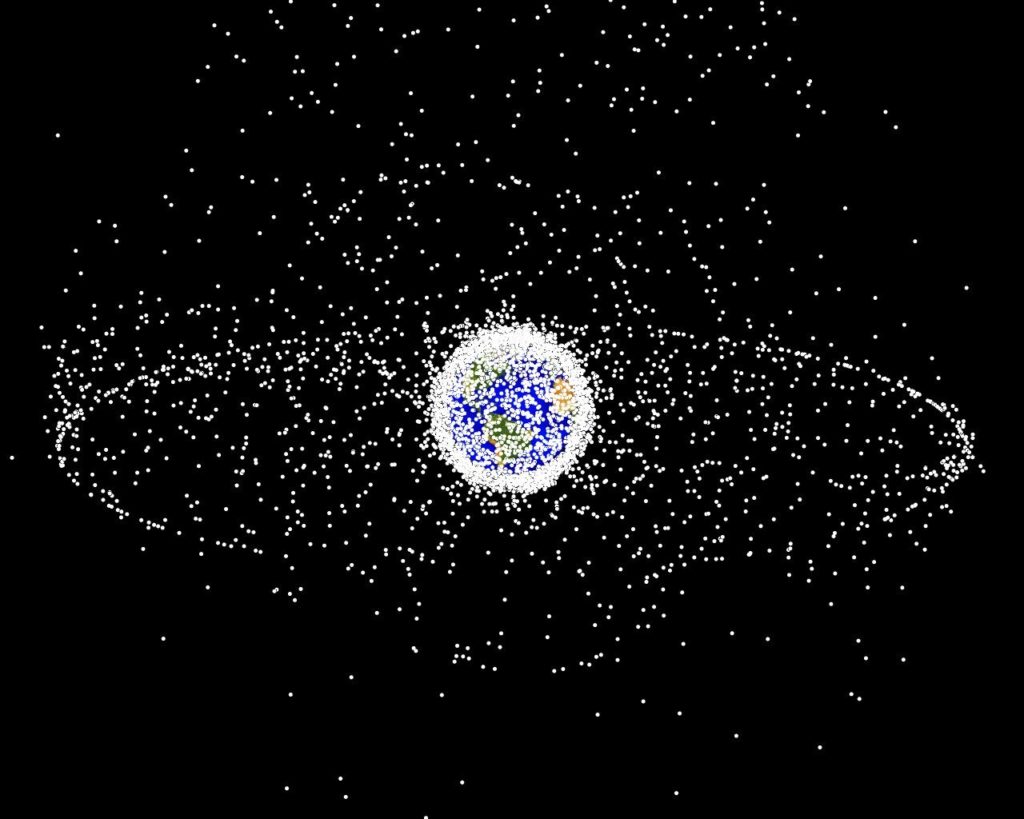Saving Outer Space
Before General Synod approved a resolution urging responsible stewardship of the outer space environment at its 2015 meeting in Cleveland, a young aerospace engineer and UCC member explained to delegates why she supported the measure. Space debris is the biggest problem her profession faces, she said, but nobody else is talking about it. The church needs to help engineers and scientists put it on the public agenda.
 |
| Space debris seen from high Earth orbit (HEO). The two main debris fields are the ring of objects in geosynchronous Earth orbit (GEO) and the cloud of objects in low Earth orbit (LEO). Photo: |
When I wrote about space junk for The Christian Century in 2008, there were 10,000 pieces of debris the size of a softball or larger orbiting Earth. Today, the figure is 23,000 and nine satellites have been demolished or disabled by debris.
And it is not just defunct satellites and rocket bodies that pose a threat to active spacecraft. A stray nut or bolt traveling at an orbital speed of 17,500 miles per hour can disable a satellite.
You would think collisions would be rare because space is so vast, but the realities of orbital mechanics limit the number of regions where spacecraft can operate to accomplish their missions. Many Earth observing satellites, for example, are located at altitudes between 800 and 900 kilometers. These spacecraft help predict and monitor famine, the outbreak of disease, natural disasters, climate change, human rights abuses, and refugee migrations.
The density of debris in this important region of space has reached a tipping point, according to a report from the National Research Council (NRC). Collisions between existing pieces of debris generate new debris faster than atmospheric drag removes the older pieces from orbit. Because the debris population is growing exponentially, the area could become too difficult for spacecraft to navigate in ten to twenty years. This is not a lot of lead time to address the problem because the answers will not be easy.
To stabilize the space environment, we will need breakthroughs in both technology and diplomacy. We need research into how to remove large existing objects from orbits where collisions are most likely to occur and we need to negotiate international agreements to limit the creation of debris, including a ban on anti-satellite weapons testing. Unfortunately, there is no real political momentum behind research or diplomacy at this time.
The UCC resolution is the first statement on the outer space environment to be adopted by a religious body. It calls on church members to educate themselves about space debris and to advocate with Congress for adequate funding of debris removal research and support of diplomatic efforts to promote the responsible use of space. It reflects an understanding that the engagement of religious and other civil sector institutions is critical for fostering the sustainable use of space.
The first satellite was launched into space in 1957, the same year the UCC was formed in Cleveland. Since then the world has become a spacefaring civilization with sixty nations and private entities operating nearly 1400 satellites that provide social, economic, and scientific benefits to billions of individuals around the world.
Instead of parking its ethical values next to the launch pad, our Space Age church is expanding its environmental perspective and public witness to encompass the global commons of outer space. To read more about space debris and what you and your congregation can do, please visit the dedicated webpage: ucc.org/space_debris.
Rev. Robert Bachelder is Minister and President of the Worcester Area Mission Society, UCC in Massachusetts and author of the General Synod resolution on responsible stewardship of the outer space environment.
Related News
The 2026 Climate Hope Art Contest
Last year's winning artwork register your church For the fourth straight year, we...
Read MoreGrowing Weary
In December 1964 during a speech in Harlem, Fannie Lou Hamer declared: “And you can always...
Read MoreOur Moral Center
“We've got about 350,000 people who are dying prematurely from the burning of fossil fuels...
Read More


